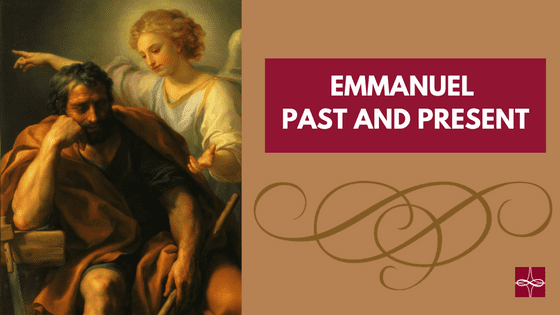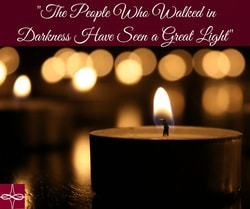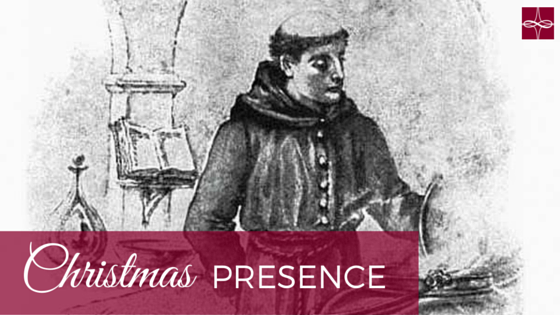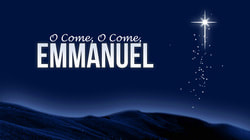|
My Catholic grade school began everyday with students lining up in the gym for attendance and then filing out to class. One morning after Thanksgiving break, our usual routine was interrupted when the principal, a Sister of St. Joseph, came up to me.
She asked, “Would you like to be Mary for an Advent Mass?” I immediately blurted out an emphatic, “No!” The other fourth graders shot me shocked stares. It would have been a dream for many of my classmates to receive such an invitation, especially a personal one from the principal! And then, of course, they were astounded that I would dare to say no to the principal herself. “Are you sure?” she asked me again. “Well, umm, I just really don’t want to. I’m sorry,” I said. The disappointment spread across her face and I knew then that she was not expecting that answer either. An awkward pause came and went as teachers and students began marching to their rooms. Finally, I said, “Well, I mean, I guess I could do that for you.” The principal beamed and listed off a number of details, like who would be St. Joseph, and when we were to arrive to change into costume. I often think back to that encounter during Advent when I reflect on Mary’s “yes” and Joseph’s sacrifice. Why did I refuse to help with such certainty? It was out of character for my usual fourth grade self.. Maybe that day my stubborn will and insecurities showed their true colors! There is an irony to saying “no” to playing the part of Mary when her “yes” was prophesied by Isaiah and echoed in the message of the psalmists. The lives of St. Joseph, St. Paul, and the gospel writers were forever changed by that answer. Now, I’m grateful for changing my answer to yes for something simple. Like Mary, I received special graces to live out the big and small yeses to God in my adult life. The readings for this Fourth Sunday of Advent focus on the message of Emmanuel.They do a good job of showing how even in our wavering human nature, God is with us. Consider the gospel from this week, where a shocked St. Joseph allows God to turn his “no” to a “yes.” I like to imagine St. Joseph’s shock after hearing about Mary’s pregnancy. He responds to the news with a dignified “no,” hoping to protect both himself and his young fiancee, until an Angel shows him the workings of the Holy Spirit in his and Mary’s lives. His sacrifice and hiddenness guides us in family life, work, ministry, and sharing the the gospel message in a noisy world. His “yes” wavered and then seemed to move to a place of confidence and trust. “Joseph, son of David, do not be afraid to take Mary your wife into your home.” (Mt 1:20) What reassurance! God was with him as he transitioned to being the head of the Holy Family, he became the ultimate protector of holiness. After the Marian story from my fourth grade year to the touch points of this weekend’s Gospel the message of Emmanuel lives. We prepare for Christmas this week with the demands of a commercial culture, family time, the healing of relationships, and the stress of “keeping up”. God is with us, waiting as he did through Isaiah and St. Paul, and the call of St. Joseph. What will we say “yes” to this week? How will God be with us in our moments of “no.”? When your fear or pride brings the word “no” to your lips, remember that God is still with you. As we await our Lord this Advent remember that he too awaits us and our emphatic “yes”. May your final week of Advent be blessed! Sophie Lorenzo works in social media marketing for a Catholic publisher in Chicago. An alum of the Echo Program at the University of Notre Dame, she enjoys bridging her background in theology with online ministry.
0 Comments
Each year, I look forward to attending Midnight Mass on Christmas. It is one of those Catholic "hallmarks" that helps us to ring in the celebration of Christmas. This year was no different, and I was able to assist at my Cathedral's celebration of Midnight Mass. As we continue on in the great octave of Christmas, I would like to look back on the readings and texts from the "Mass During the Night," more commonly known as Midnight Mass. “O God, [you] have made this most sacred night radiant with the splendor of the true light…” (Collect, Christmas Mass During the Night). Sometimes I scratch my head trying to make sense of the Collect prayer, the “opening prayer,” used during the Mass. The Collect prayer that we prayed during Midnight Mass, though, is quite fitting for this particular celebration of the Eucharist, as the Church throughout the world gathered together in the quiet stillness of the night to celebrate the birth of Jesus Christ, the “infant [found] wrapped in swaddling clothes and lying in a manger” (Lk 2:12). This “most sacred night” is indeed “radiant with the splendor of the true light," the light of Christ, the light that brightens not only the darkness of the night sky but also the darkness of our world, the darkness that often creeps its way into our own lives and our own hearts. “The people who walked in darkness have seen a great light” (Is 9:1)! When we find ourselves in a dark room, or when the sun begins to set at the end of the day, what do we do? We turn on a lamp; we turn on the lights. When we find ourselves in internal times of darkness, what do we do? We should turn to Jesus Christ, who, as we hear so beautifully articulated in the Proclamation of the Birth of Christ, is the “eternal God and Son of the eternal Father, desiring to consecrate the world by his most loving presence…” “The people who walked in darkness have seen a great light” (Is 9:1)! The words that the prophet Isaiah addressed to us in the first reading from this Mass are so filled with meaning for us, especially as we fumble and flounder in the darkness of our world and in our own lives. For upon us all, “a light has shone” (Is 9:1). We often walk in darkness: the darkness of our own worries and anxieties, the darkness of our own sins and shortcomings, the darkness of loneliness and isolation. Whatever burdens us, Isaiah invites us to be brought from darkness into God’s most marvelous light, which is found in the person of Jesus Christ. Isaiah tells us that “upon those who dwelt in the land of gloom a light has shone” (Is 9:1). The light that shone in the time of Isaiah is the same light that shone on the “shepherds in that region living in the fields and keeping the night watch over their flock” (Lk 2:8). As the shepherds were keeping watch, “the angel of the Lord appeared to them” (Lk 2:9). On that holy night in Bethlehem, only the humble shepherds were aware of the Word becoming flesh—of Jesus being born of the Virgin Mary. Today, the whole world knows of the Light of the World, Emmanuel—“God-is-with-us,” “Wonder-Counselor, God-Hero, Father-Forever, Prince of Peace” (Is 9:5)…our “savior Jesus Christ, who gave himself for us to deliver us from all lawlessness” (Ti 2:14), to deliver us and grant us peace and consolation from all that causes chaos or disorder or stress in our lives. “The people who walked in darkness have seen a great light” (Is 9:1)! Our Holy Father, Pope Francis, reflecting on these beautiful words, talks about light—the permeating theme of the great solemnity that we celebrate at Christmas. Our Holy Father says, “The people who walked–caught up in their activities and routines, amid their successes and failures, their worries and expectations–have seen a great light. The people who walked–with all their joys and hopes, their disappointments and regrets–have seen a great light. In every age, the People of God are called to contemplate this light. … A light meant to shine on every corner of this city, on our fellow citizens, on every part of our lives” (Homily of Pope Francis, 25 September 2015). “The people who walked in darkness have seen a great light” (Is 9:1)! As we continue to celebrate the great Nativity of the Lord—Christmas—we rejoice with Isaiah: “For a child is born to us, a son is given us; upon his shoulder dominion rests. They name him Wonder-Counselor, God-Hero, Father-Forever, Prince of Peace” (Is 9:5). The Psalmist invites us to “exult before the LORD, for he comes; for he comes to rule the earth. He shall rule the world with justice and the peoples with his constancy” (Ps 96: 13). The Lord is forever faithful. We are called to “[proclaim] the marvels of the Wonderful Counselor, the Mighty God, the Eternal Father, the Prince of Peace” (Homily of Pope Francis, 25 September 2015). We do this by serving as beacons of light amidst the darkness of our world, radiating the light, the “abundant joy” (Is 9:2), the love, the “blessed hope” (Ti 2:13) of Jesus Christ, proclaiming with “great rejoicing” (Is 9:2) the “good news of great joy” (Lk 2:10). “The people who walked in darkness have seen a great light” (Is 9:1)! “Let us all rejoice in the Lord, for our Savior has been born in the world. Today true peace has come down to us from heaven” (Entrance Antiphon). Let us join our hearts and voices this Christmas night and proclaim: “Glory to God in the highest and on earth peace to those on whom his favor rests” (Lk 2:14). “Silent night, holy night, wondrous star, lend thy light; with the angels let us sing, Alleluia to our King; Christ the Savior is born, Christ the Savior is born!” (Stille Nacht, Fr. Joseph Mohr) You don’t need to spend a dime to understand Christmas is all about presence. The Church sings, “Emmanuel- God is with us!” God’s gift to the world is his presence, Jesus our Savior. During the holidays, however, life tends to get busy and expensive. Presence yields to presents. When this happens, as it always seems to, I think of Brother Lawrence. Like the great mystic and reformer, St. John of the Cross, Lawrence (1605-91) was a Carmelite monk. But unlike St. John, Lawrence was a lay brother who spent his “unremarkable” life cooking and cleaning. In fact, all that remains are some recollected conversations and a few scattered letters posthumously compiled by another monk into a short, now classic, spiritual work called The Practice of the Presence of God. His conversion happened one winter after “seeing a tree stripped of its leaves, and considering that within a little time the leaves would be renewed, and after that the flowers and fruit appear” (First Conversation) We need Brother Lawrence to remind us that Christmas is all about presence. For Lawrence, this means having a sense of God’s love in the middle of our busy and distracted lives during the Christmas season, a way of “doing our common business purely for the love of God” (Fourth Conversation). He reminds us to be about God’s business during our busyness. Three of Brother Lawrence’s key insights can help us practice the presence of God this Christmas. Give Your Time Christmas is more about being present than buying presents. The most precious gift we have to give someone is our time. As Christmas gets piled high with shopping, decorating, work, or final exams, the gift of time seems to have the highest price tag. Brother Lawrence reminds us that God is present to us in all times and places: "The time of business does not with me differ from the time of prayer; and in the noise and clatter of my kitchen, while several persons are at the same time calling for different things, I possess God in as great tranquility as if I were upon my knees before the Blessed Sacrament.” (Fourth Conversation) The Nativity celebrates the presence of God on earth, a God who came as an unexpected, untimely, and therefore unwelcome stranger. I think we all know people like that! Being present to God may mean letting ourselves be interrupted or making time for a family member we’d rather ignore, and letting God speak. Celebrate Small Things When we think Christmas, we think miracles. But the great mystery of the Incarnation reveals that God also shows his human face in the smallest, most mundane aspects of life. Brother Lawrence says: “We can do little things for God. I turn the cake that is frying on the pan for love of him . . . who has given me grace to work . . . It is enough for me to pick up but a straw from the ground for the love of God" (The Practice of the Presence of God and The Spiritual Maxims). Brother Lawrence points to the presence of God hidden even among life’s most unpresentable circumstances by faithfully doing unglamorous things for God’s glory. Celebrate Symbols It’s tempting to scoff at the more trivialized or sanitized secular symbols of “the holidays.” Rather than spending Christmas railing against materialism, we can imitate the example of Brother Lawrence, who presents a more constructive, creative way to counteract the consumer culture without pointing out other’s shortcomings. Brother Lawrence would turn everyday objects (like pots and pans) into an occasion to praise God. He did this by making them into little actionable reminders. For example, when you see Christmas lights, say, “Christ is my light.” Or pass a snowman and pray for a friend in need. In this way, we “re-symbolize” the world around us. There are a million possibilities. Come up with a few of your own and make it a habit. Especially at Christmas, the whole world is a reminder of God’s love and presence. All of creation is a conversation starter with God, a conversation called prayer, or as Brother Lawrence would say, “the practice of the presence of God.” For more ways to prepare for the coming of the Savior this Advent and Christmas, please visit our Advent Resources page. This Sunday is the Fourth Sunday of Advent, the last Sunday before we celebrate the birth of Christ at Christmas. These four weeks are an opportunity for us as Catholics to take time to reflect on our spiritual lives. As we’ve seen in posts throughout this Advent season, we must look at Advent as a journey, both as a time to prepare for Christ’s coming this year, but also as a way of looking at the future to prepare for Christ’s second coming. Advent is a time filled with joy and introspection, where we strive to find the quiet moments within a busy season.
This Sunday, the first reading from Isaiah tells of the eventual birth of Christ. Isaiah prophecies that the Lord will give mankind a sign, a son born of a virgin mother, to be called Emmanuel. St. Paul, in the second reading, reminds us that Christ was put here on earth “as Son of God in power, according to the Spirit of holiness. (Isaiah 1:4) Then in the gospel reading from St. Matthew, we hear the story of the nativity, referencing the fulfillment of Isaiah’s words. Here it is reiterated that Christ will be called Emmanuel, which means “God is with us.” This is a good reminder at the conclusion of the Advent season. The gospel tells us that Christ’s coming is the true manifestation of God here on earth, and the name Emmanuel is a literal representation of this. The name Emmanuel is also a reminder to all of us that God is with us, even now in our everyday lives. It is easy during Advent or other important liturgical seasons to feel God’s presence more strongly. During the Christmas season we hear stories of incredible generosity and kindness, many in the name of Christmas spirit. Food banks and Homeless Shelters and other social welfare institutions report higher donations and volunteers during the holidays. Generosity and volunteering of time is always a rewarding way to live out the gospel, but to truly embrace the spirit of Christ as Emmanuel, we must do our best to keep God with us throughout the entire year, not just during holiday seasons. Pope Francis’s message of the importance of ministering to the poor and marginalized is applicable here especially. The Holy Father encourages us to see the face of God in everyone, especially in those who are most in need. We must remember that God is with us, in every aspect of our life, and we must strive to carry the spirit of kindness and generosity throughout the whole year. Rebecca Ruesch is the Blog Editor for the Catholic Apostolate Center |
Details
Archives
July 2024
Categories
All
|
About |
Media |
© COPYRIGHT 2024 | ALL RIGHTS RESERVED







 RSS Feed
RSS Feed